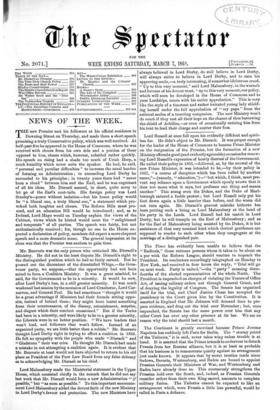Mr. Bouverie was the only person who criticized Mr. Disraeli's
Ministry. He did not in the least dispute Mr. Disraeli's right to the distinguished position which he had so fairly earned. But he poured out the discontent of the dissatisfied Whigs,—the Gros- venor party, we .suppose,—that the opportunity had not been seized to form a Coalition Ministry. It was a great mischief, he said, for the Government to be in a minority. It would be now, after Lord Derby's loss, in a still greater minority. It was much weakened last session bythe secession of Lord Cranborne, Lord Car- narvon, and General Peel. He had sometimes "thought it would be a great advantage if Ministers had their friends sitting oppo- site, instead of behind them ; they might have learnt something from their countenances, of the dismay, astonishment, surprise, and disgust which their conduct occasioned." But if the Tories had been in a minority, and were likely to be in a greater minority, the Liberals were in no better position. "We have leaders that won't lead, and followers that won't follow. Instead of an organized party, we are little better than a rabble." Mr. Bouverie thought Lord Derby right in trying to effect a coalition in 1866. He felt no sympathy with the people who made " Disraeli " and " Gladstone " their war cries. He thought Mr. Disraeli had made a mistake in not attempting a coalition again. It is evident that Mr. Bouverie at least would not have objected to return to his old place as President of the Poor Law Board from any false delicacy as to acknowledging Mr. Disraeli as his chief.


































